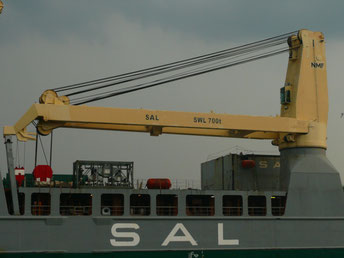SAL Heavy Lift Vessel Typ 176

Guest article

Christina Wagner
From type 161b to type 176
As I had already announced in my article on the Type 161, I have taken the time today to introduce the heavy-lift carriers of the Type 176 here.
After SAL had received its tenth and last heavy-lift carrier of the type 161 from the J.J. Sietas shipyard in 2004, the type 176, a much more powerful type of heavy-lift carrier, came into
service from 2008. In terms of basic concept, the new type was based on the ships of type 161b. Compared to the predecessor ships, however, the lifting capacity of the larger Type 176 was doubled
to up to 1,400 t by two 700 t NMF cranes.
The two photos below show the type 161b and the type 176. The photos taken on the Elbe show the differences between the ships very clearly.
Type 176
In 2005, the contract for the construction of 4 ships was concluded between SAL and the J.J. Sietas shipyard. The new ships were intended to meet the growing demand
for increasingly efficient heavy-lift carriers. Even before the completion of the first ship, SAL entered into a joint venture with the Japanese "K" Line. In 2011, the Japanese took over SAL
completely, which was renamed SAL Heavy Lift in 2013.
With a length of 159.8 m, the ships of this type were only slightly longer than their predecessors. However, the width of the ships was increased by 3 m to 24.00 m
for stability reasons.
With the 700 t cranes, Neuenfelder Maschienfabrik (NMF) produced its largest ship cranes to date. The crane jibs can lift a load of up to 700 t at up to 14 m. At
the maximum reach of 30 m, it is still 350 t. The auxiliary hoist can move loads of up to 60 t at 33 m.
On the starboard side, a third crane with a lifting capacity of 350 t, which corresponds to the main cranes of type 161b, is used on these
ships.
The main engine used on these ships is a 4-stroke, 9-cylinder diesel engine of the type MAN B&W 9L 58/64. With an output of 12,600 KW, it enables the ships, which are driven by a controllable
pitch propeller, to reach a speed of up to 20.0 knots.
The first ship of this type, the FRAUKE, was delivered in February 2008. Already in April, J.J. Sietas Wewrft delivered the second ship, the ANNE-SOFIE, to SAL. In November the TRINA followed. On
this ship, and also on the REGINE delivered in September 2009, the deckhouse was raised by one deck. This makes it possible to take additional persons on board for special jobs, such as offshore
work.
I have compared the two versions in a drawing.

| Length over all: |
159,80 m |
| Breadth moulded: | 24,00 m |
| Breadth over all: | 24,34 m |
| Depth moulded: | 13,20 m |
| Draught: | 9,08 m |
| GT: | 12.950 / TRINA und REGINE 13.058 |
| Deadweight: | 12.007 t |
| Displacement: | 21.400 t |
| Hold dimension : |
107,10 m x 17,00 m x 13,10 m |
| Volume hold: |
19.299 m³ |
| Free deckspace: |
3.128 m² |
| Cargo gear: |
2 x NMF 700 t SWL (gekoppelt 1.400 t) 1 x NMF 350 t SWL |
| Main engine: |
1 x MAN B&W 9L 58/64 Dieselmotor mit 12.600 kW |
Photogalerie
This is not the end of the history of the series of heavy-lift vessels. After the Type 161 and the Type 176, an even more powerful type of this series followed in 2010, the Type 183, which I will also present here shortly.















